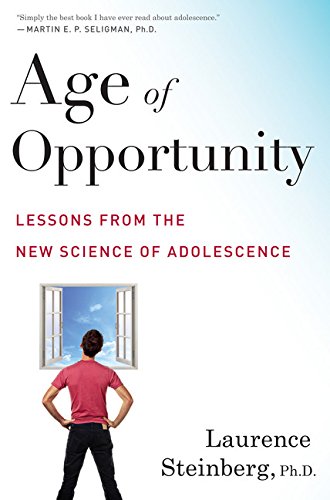
Age of Opportunity
Lessons from the New Science of Adolescence
کتاب های مرتبط
- اطلاعات
- نقد و بررسی
- دیدگاه کاربران
نقد و بررسی

July 21, 2014
In this commentary on, and action plan for, raising young adults, Temple University psychology professor Steinberg (You and Your Adolescent) mines cutting-edge research that unveils the neuroplasticity of the teen brain—a discovery that makes adolescents “the new zero to three,” a time in which experiences greatly influence brain development and future success. During adolescence, the brain’s malleability offers extraordinary opportunity as well as great risk and peril (the latter if environments and experiences are toxic), Steinberg notes. The author calls upon parents, schools, and American society to take a new approach to this developmental stage. By parenting authoritatively, with warmth, firmness, and support, parents can help their children develop self-regulation and noncognitive skills that promote physical and psychological well-being. Explaining complex brain science in a clear-cut manner, Steinberg offers parents and educators practical advice, as well as innovative ideas about how society can better support its youth and adapt to the times; many of our youth-related issues, he asserts, are uniquely American. This is a convincing and eloquent call for change. Agent: James Levine, Levine Greenberg Rostan Literary Agency.

September 1, 2014
Listen to so-called talk show "experts" or peruse books about family communications and they'll advise asking kids why they did what they did, why they got in trouble, why they acted so irresponsibly. This is the wrong approach, according to Steinberg (psychology, Temple Univ.; Adolescence; Beyond the Classroom). Teens can't know why they do what they do; they can't think about future consequences when they are emotionally charged. So adults need to optimize healthy development of teens, limiting opportunities for potentially risky behavior to take place at all. The brains of 13 through 20 year olds are very malleable, ready to change and learn in positive, supportive environments. Steinberg focuses on aspects that others ignore--e.g., the "reminiscence bump" (how and why we remember distinctly events from adolescence), the extreme importance of self-regulation (motivation), and why high schools must become more academically demanding and less boring. Be warm, he advises; be firm, be supportive. VERDICT Adolescence starts early and lasts a long time. Steinberg's book is fresh and new; essential reading for parents, teachers, and counselors.--Linda Beck, Indian Valley P.L., Telford, PA
Copyright 2014 Library Journal, LLC Used with permission.

























دیدگاه کاربران